ᐃᖃᓇᐃᔭᖅᑎᖃᖏᓚᖅ ᓱᓕ

2021-22-ᒥᑦ;
ᐸᓴᒋᔭᐅᓪᓗᓂ $13,000 ᐱᕋᔭᖕᓂᕐᒧᑦ ᐱᖁᑎᓄᑦ


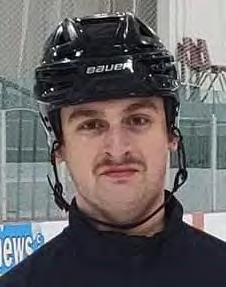
GN’s forfeiture office remains vacant ᐊᑮᑦᑐᖅ
Expenses exceeded $150,000 in 2021-22; property suspected of being obtained by crime amounts to $13,000
Construction contract awarded for Nunavut treatment centre
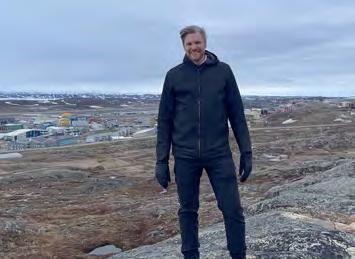
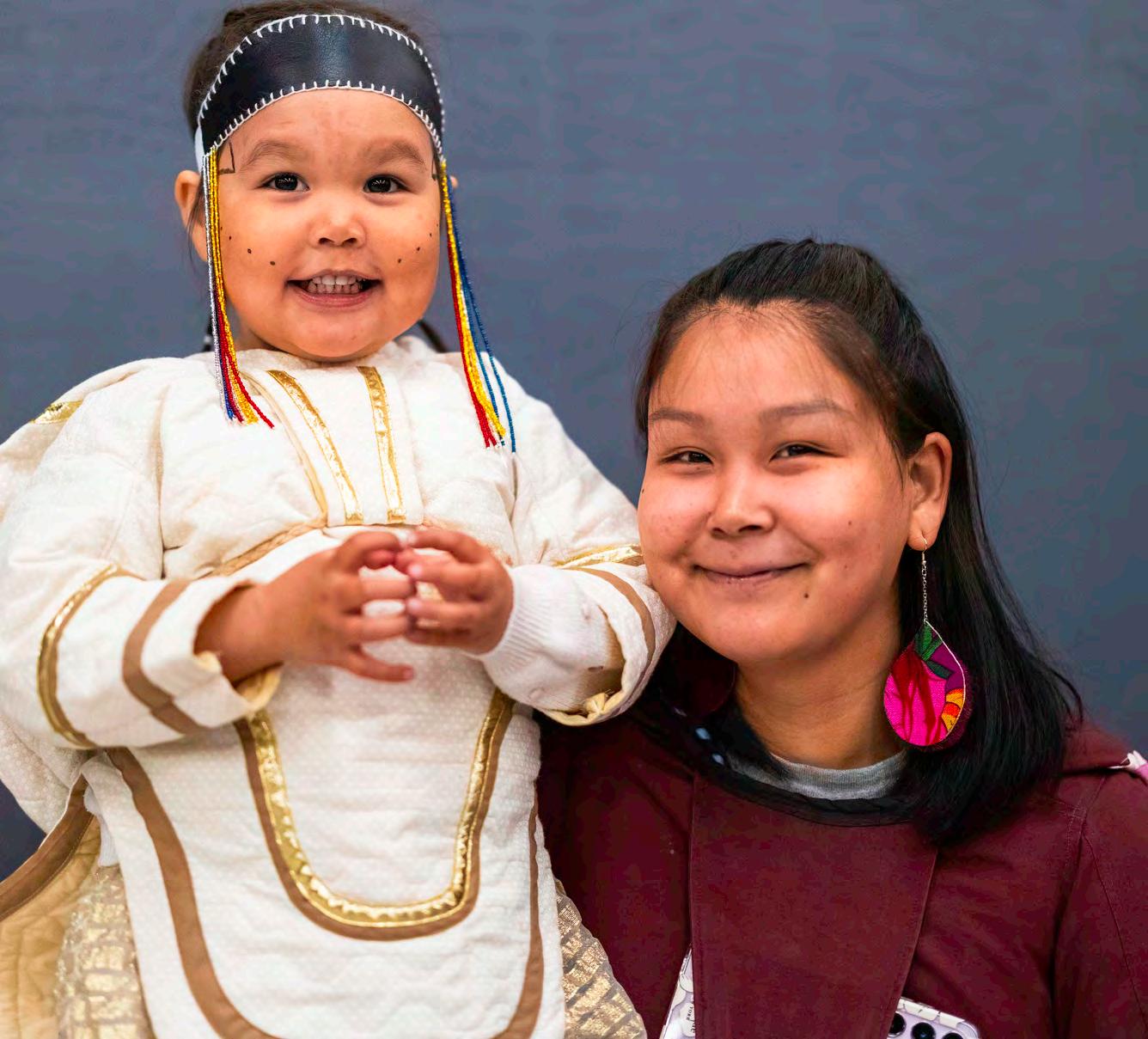
ᐱᑐᓚ ᐸᓂᒍᓂᐊᖅ ᐊᒪᓗ ᑕᐅᕋ ᑭᓕᐅ ᐊᓇᐅᑕᒃ ᐊᔨᓕᐅᖅᑕᐅᕗᑦ ᓄᓇᕗᑦ ᐅᓪᓗᐊᓂ ᖁᕕᐊᓱᖕᓂᖃᖅᑎᓪᓗᒋᑦ ᑲᖏᖅᖠᓂᕐᓂ. Volume 77 Issue 62 MONDAY, JULY 17, 2023 $.95 (plus GST) Publication mail Contract #40012157 7 716050020 0 2 Recreation ᐱᓕᖕᒪᒃᓴᐃᔩᑦ ᐱᖑᐊᖅᑎᓄᑦ ᑲᓇᑕᒥ ᓇᓗᓇᐃᑯᑕᕐᒥᒃ ᐱᑖᖅᐳᑦ Coaches earn national awards Transportation ᑎᖕᒥᓲᖅᒥᒃ ᐃᑭᒪᔨᐊᖅ ᐅᓂᑲᐅᓯᖃᖅᐳᖅ ᑎᖕᒥᓲᖅ ᐊᖁᑎᒥᒃ ᓯᓚᖁᔅᔨᓕᓚᐅᕐᓂᖓᓐᓂᒃ Passenger recounts plane sliding off runway On the Land ᐱᑭᐅᑕᕆᐊᖅᑐᑦ ᑲᖑᕐᓂᒃ Going in search of geese eggs ᓇᖕᒥᓂᕆᔭᐅᔪᒥᒃ ᐊᖅᓵᓯᓂᕐᒧᑦ
ᑎᑎᕋᕐᕕᒃ
ᖁᒻᒧᒃᓯᒪᕗᖅ $150,000-ᒥᒃ
ᐊᕌᒍ
day
Oh, happy
ᕿᔪᓕᕆᔩᑦ ᐱᓕᕆᖃᑎᖃᕐᓂᒧᑦ ᑐᓂᔭᐅᕗᑦ ᐱᓕᕆᐊᒃᓴᒥᒃ ᓄᓇᕗᒻᒧ ᒪᒥᓴᕐᕕᒃᓴᒥᑦ
Petula Panigoniak and Tyra Claire Anautak pose for a photo during Nunavut Day festivities in Rankin Inlet. Stewart Burnett/ NNSL photo
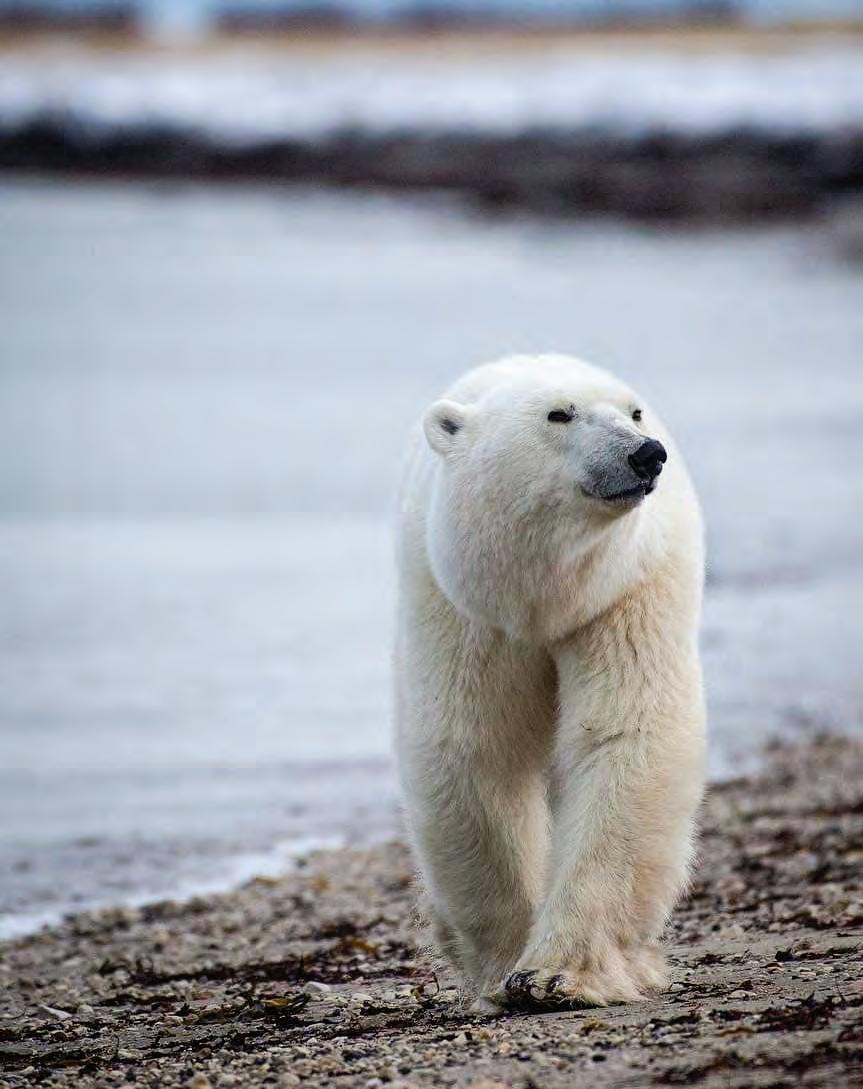

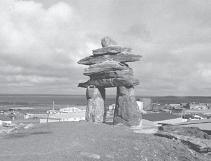

Nunavut News www.NunavutNews.com A2 Monday, July 17, 2023 kNKu W?9oxJ5
GN’s Civil Forfeiture Office still seeking new director
Division racked up $159,000 in expenses in 2021-22 while seizing $13,000 in property to date
 By Tom Taylor Northern News Services
Local Journalism Initiative reporter
By Tom Taylor Northern News Services
Local Journalism Initiative reporter
The Government of Nunavut’s Civil Forfeiture Office is currently operating without a director.


The director role — the lone position within the division, which is headquartered in Iqaluit — was most recently held by David Lawson, a former RCMP officer who was brought on in June 2021. However, the role has been vacant since February, when Lawson took a position as the Department of Justice’s assistant deputy minister of public safety, said Department of Justice spokesperson Peter Varga.
The forfeiture office handles its own investigations, and has seized approximately $13,100 in proceeds of criminal activities to date.
Its total expenditures for the 2021-2022 fiscal year were $158,974.
The department is currently “undertaking a search for a candidate to take the (director) position,” Varga said. In
the meantime, the forfeiture office’s operational files are being handled by the department’s legal and constitutional law division.
The forfeiture office was created in tandem with the territory’s Unlawful Property Forfeiture Act, which came into effect on April 1, 2021.




The overarching goal of the office, as detailed by the act itself, is to “prevent people who engage in unlawful activities and others from keeping property that was acquired as a result of unlawful activities, prevent property from being used to engage in unlawful activities, and allow for the disposition of property derived from or used to engage in unlawful activities to socially useful purposes such as providing assistance for victims of crime and funding community-based wellness programs.”
The forfeiture office has received approximately 10 files per year since it was created, according to Varga. The office can receive tips from the public and RCMP, but every tip to date has been submitted by the former.




News North Nunavut www.NunavutNews.com A4 Monday, July 17, 2023 kNKu W?9oxJ5
Former police officer David Lawson, who’s originally from Pangnirtung, was Nunavut’s last director of the Nunavut’s Civil Forfeiture Office. The position has been vacant since February. The purpose of the the Government of Nunavut’s forfeiture office is to seize assets obtained through the proceeds of crime. Photo courtesy of David Lawson
Plane slips off runway at Mary River mine site; no passengers injured
Incident occurred as charter flight was taxiing
By Tom Taylor Northern News Services
Journalism Initiative reporter


Early on the morning of Monday, July 10, a charter plane slipped off the runway at the Mary River iron mine site, nearly tipping onto its side as a result.

The aircraft, operated by Summit Air, was bound for Clyde River. The incident occurred
during taxiing, before takeoff. There were five Baffinland employees and two crew members on the flight.
Nobody was injured.
Adamee Atsiqtaq, one of the passengers on board, called the experience “one of the scariest” of his life.
“It’s still fresh in my mind,” he said from Clyde River, two days after the incident. “It was very scary. You realize life is precious.”
Atsiqtaq said officials “came over right away” after the plane went off the runway, and set up a step ladder outside the door of the aircraft to help passengers disembark.
It was not difficult to exit the plane, he said.
Baffinland Iron Mines, the company that operates the Mary River mine, acknowledged the incident in an email.

Peter Akman, the company’s head of stakeholder relations and communications, said Transport
Canada was notified of the incident and an investigation into the cause is underway. He said the mining company immediately offered counselling to the passengers on the plane.
Atsiqtaq, who believes he is experiencing symptoms of post-traumatic stress disorder (PTSD) and has been using cannabis to manage his stress, said he will never board a plane again.
“Life’s too short,” he said. “I don’t want to get on a plane when I have no control over it.”

News North Nunavut www.NunavutNews.com A6 Monday, July 17, 2023 kNKu W?9oxJ5
A charter flight bound for Clyde River slipped off the runway during taxiing at the Mary River mine site on July 10. There were seven people on board, including five mine employees, but nobody was injured. Photo courtesy of Adamee Atsiqtaq
Local
Family egg-picking trips a source of ‘calm’ for Pond Inlet’s Nadia Ootoovak
20-year-old has been spending time on the land for as long as she can remember
By Tom Taylor Northern News Service Local
reporter
Nadia Ootoovak has been spending time on the land with her family for as long as she can remember.
The 20-year-old from Pond Inlet, who is the second eldest of six siblings, has participated in fall narwhal hunts, spring fishing trips and lots more.

She enjoys all of her time on the land, but said her favourite activity comes in the late spring, when she and her parents and siblings load up their qamutiiks and venture far out of town in search of snow geese eggs.
“One thing I look forward to every year is the egg picking,” she said. “It’s one of my favourite things to do. My siblings too.
“You get a lot of eggs from the land. We also get the geese every now and then – not a lot, just enough for us.”
One of Ootoovak’s favourite memories on the land occurred on one such egg-picking trip. It was about two years ago, she said, when one of her younger sisters, who was roughly 11 at the time, had just started riding a snowmobile.
Ootoovak’s father, who was riding with her mother and another sister, was leading the family on the trip. When he came to a river, he paused to decide the best course of action.
“We all had backpacks and we were going out for geese eggs,” Nadia recounted. “Everything had just started melting. The rivers were flowing and the current was strong.
“My dad was staring at the river for maybe a minute or two, thinking about where he should go to cross that river. Then he looked at my younger sister and said, in Inuktitut: follow my lead exactly.”
Ootoovak’s father crossed the river first, moving “pretty fast” on his snowmobile. Her older sister, who was riding with her boyfriend and son, crossed next.
A cluster of snow goose eggs in an area called Qunguliqtuut. Pond Inlet’s Nadia Ootoovak has been egg picking with her family for as long as she can remember, and has also participated in narwhal hunts and fishing trips. Photo courtesy of Nadia Ootoovak

Ootoovak, who was riding with her younger brother, took her turn next, and also made it across.
That just left her 11-year-old sister, who had an even younger sister riding with her. Their snow machine made it across the river – but barely.
“Instead of going fast like my dad did, she
Ready for the roads ᐃᖏᕋᓯᒋᐊᒃᖠᕗᑦ
Bike rodeo gives out helmets, lessons
By Stewart Burnett Northern News Services, Local Journalism Initiative, Rankin Inlet
Helmeted up, more than 20 children learned some bike safety tips and completed a course during the bike rodeo hosted by the RCMP and other community organizations in Rankin Inlet Friday, July 7.

“The helmets are a huge thing,” said Cst. Matt Hope, who led the event. “Obviously head, neck, face, spine injuries are prominent, especially if you don’t wear a helmet.”
It’s a busy little town, he said, with cars and ATVs on the roads, so bike safety, keeping an eye on traffic and being aware of your surroundings is important.
Public health donated the helmets, said Hope. The fire department was also present at the rodeo.
“Every kid gets a bike helmet and there’s a little bag with some goodies, and we brought along a bunch of snacks and some RCMP reflectors, which are designed for bikes as well,” said Hope.
He was glad to see the youth display some good habits and pick up the safety tips quickly.
“They all did great,” said Hope. “Some of them were prone to cutting corners a little bit there, but it was great that they listened. They pretty much took the course as we hoped they would.”
He added that it was also a good opportunity
went so slow,” Ootoovak said with a laugh. “The Ski-Doo almost tipped over, but she made it across the river.”
Ootoovak created lasting memories on that egg picking trip, but it also reaffirmed the importance of knowledge sharing as it pertains to surviving on the land.
A lot of Inuit wisdom, she notes, has not been written down, and is therefore best absorbed by speaking to older generations on the land.
“These things are not usually documented,” she said. “Just recently they started documenting information here and there. It’s important
ᐸᓕᓯᕋᓛᖅ ᒪᑦ Hᐅᑉ ᖁᖏᐊᖅᑎᑎᕗᖅ
ᖃᓄ ᓇᓗᓇᐃᖅᓯᓂᖅ ᓴᖑᓕᕈᓂ
ᐊᖁᑎᒃᑯᑦ. NNSL/ᐊᔨᖁᑎ ᓱᑐᕈᑦ ᐳᕐᓂᑦ
that you go [on the land] in person so you can see how [Elders] look at things and how they describe things out there.”
Ootoovak hopes to keep spending as much time as she can on the land – not only because it gives her a “sense of self” as an Inuk, but because it helps her escape the strains and stresses of her life in town.
“All of my other feelings disappear,” she said. “I feel calm. I don’t feel stress. I don’t feel overwhelmed with work or anything.
“I don’t have to worry about anything – other than big animals.”
for the RCMP to engage with children.
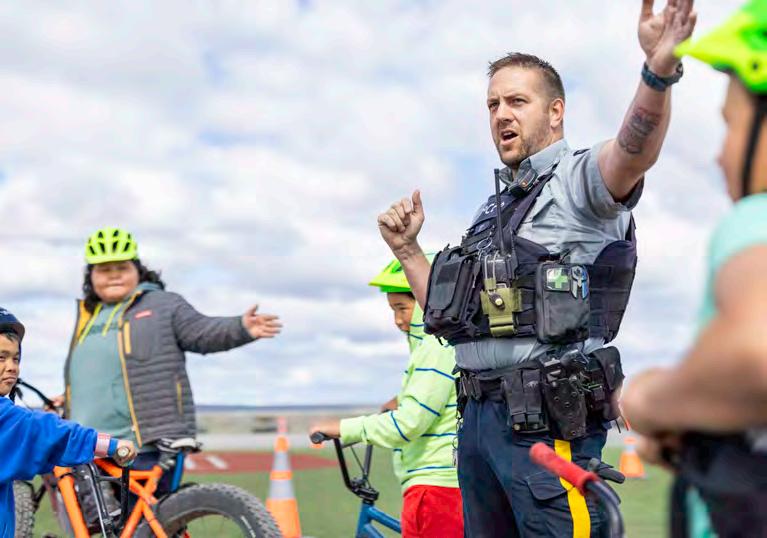
“We’re really busy here as police and to be able to come out and spend an hour or two with the kids on bikes to do something fun is really important,” he said.
ᐊᖁᑦᑐᓐᓇᕐᓂᕐᒥᒃ ᑐᑲᕆᐊᓕᒃᑯᑦ, ᐃᓕᓐᓂᐊᖅᑎᑕᐅᒋᓪᓗᑎᒡᓗ ᐊᑕᕐᓇᖏᑦᑐᒃᑯᑦ ᐃᒋᕋᓂᖅ ᐊᖁᑎᒃᑯᑦ, ᐸᓕᓯᒃᑯᑦ ᐱᓕᕆᑎᑎᑎᓪᓗᒋᑦ ᓄᓇᓕᖕᓂᑦ, ᑲᖏᖅᖠᓂᖅ ᐱᖃᑕᐅᓪᓗᓂ. ᐅᓪᓗᑐᐃᓐᓇᖅ ᔪᓚᐃ 7. ‘ᑎᓯᔪᑦ ᓇᓴᐃᑦ ᐱᒻᒪᕆᐅᕗᑦ’ ᐸᓖᓯᕋᓛᖅ ᒪᑦ Hᐅᑉ ᐅᖃᖅᐳᖅ ᐱᓕᕆᑎᑦᑎᔪᖅ. ᓂᐊᖁᖅ, ᖁᖓᓯᖅ, ᑮᓇᕗᑦ, ᕿᑎᕐᓗ ᓴᐳᒻᒥᑎᓯᒪᔭᕆᐊᖃᕋᑦᑎᒍ, ᐱᕈᓗᐊᕿᔪᖃᕋᔭᖅᐸᑦ
ᐃᓗᕆᐊᓇᖑᖕᒪᑕ ᑖᑯᐊ ᑎᒥᑦᑎᓐᓂ.
ᓄᓇᓕᕋᓚᖅ ᐅᐃᒪᔮᕐᒪᑦ ᐊᖁᑎᖓ ᐃᖏᕋᔪᑎᓄᑦ, ᓄᓇᓯᐅᑎᓄᑦ, ᑎᓴᒪᓕᖕᓄᓪᓗ, ᐱᒻᒪᕆᐅᕗᖅ ᑐᑲᕆᐊᓕᒃᑐᑦ ᐅᔾᔨᖅᓱᕈᓇᓂᖃᕆᐊᖃᖅᐳᑦ ᐊᑦᑕᕐᓇᖏᑐᒃᑯᑦ, ᐃᔾᔨᖅᓱᕈᓐᓇᕐᓗᑎᒡᓗ ᐊᕙᑎᐊᓂᒃ. ᐋᓂᐊᖃᕐᓇᖏᑐᓕᕆᔨᒃᑯᑦ ᑭᒃᑯᑐᐃᓇᕐᓄᑦ
ᑐᓐᓂᖅᓴᐃᓚᐅᖅᐳᑦ ᐊᑭᖃᖏᑦᑐᓂᒃ ᑎᓯᔪᖅ ᓇᓴᕐᓂᒃ, ᐅᖃᖅᐳᖅ. ᖃᑎᕆᔨᒃᑯᑦ ᑕᐃᑲᓂᓚᐅᕆᕗᑦ. ᐊᑕᖏᖅᖢᒋᑦ ᓄᑕᖅᖃᑦ ᑎᓯᔪᒥᒃ ᓇᓴᖅᑖᖅᑎᑕᐅᕗᑦ, ᐃᓚᖃᖅᑐᒥᒃ ᒪᒪᖅᑐᓂᑦ, ᑕᒧᐊᔭᒃᓴᒐᓛᓂᒃ, ᖃᐅᒥᔮᖅᑕᖅᑐᓪᓗ ᑐᑲᕆᐊᓕᖕᒧᑦ ᐊᑐᖅᑕᐅᓲᑦ ᐸᓕᓯᓂᒃ. Hᐅᑉ ᐅᖃᖅᐳᖅ. ᐱᑯᒍᓱᓚᐅᕆᕗᖅ ᓄᑕᖅᖃᑦ ᐃᓕᑦᑎᑲᐅᑦᑐᓚᐅᕐᒪᑕ ᐊᑦᑕᕐᓇᖏᑦᑐᑰᕆᐊᒃ. ‘ᑕᒪᕐᒥᑦᑎᐊᖅ ᐱᓕᕆᑦᑎᐊᓚᐅᖅᑐᑦ’ Hᐅᑉ ᐅᖃᖅᐳᖅ, ᓴᖑᑕᕈᔫᔭᑲᑕᓚᐅᖅᑑᒐᓗᐊᑦ ᐃᓚᖏᑦ ᑭᓯᐊᓂ ᐱᒃᑯᓇᓚᐅᖅᐳᑦ, ᓈᓚᑦᑎᐊᖅᖢᑎᒡᓗ. ᐊᑐᑦᑎᐊᓚᐅᖅᑕᓂ ᐱᓕᕆᖃᑕᐅᔭᓂ, ᑕᐃᒪᐃᓂᐊᕋᓱᒋᓚᐅᕋᒃᑯ. ᐱᔪᓐᓇᕐᓂᖃᓚᐅᕐᒪᑕ ᐱᕕᖃᖅᖢᑎᒃ ᐸᓖᓯᒃᑯᑦ ᐱᑯᒍᓱᒃᐳᑦ.
ᐱᓕᕆᐊᒃᓴᖃᕕᒡᔪᐊᕋᑦᑕ ᐸᓖᓯᒃᑯᑎᒍᑦ ᑭᓯᐊᓂ
News North Nunavut Monday, July 17, 2023 A7 www.NunavutNews.com kNKu W?9oxJ5
ᑐᑲᕆᐊᓕᒃᑯᑦ ᐃᓕᓐᓂᐊᖅᑎᑎᔪᑦ ᑐᓂᐅᖃᐃᕗᑦ ᑎᓯᔪᒥᒃ ᓇᓴᕐᓂᒃ
ᑎᓯᔪᒥᒃ ᓇᓴᕆᑦᑎ, 20 ᐅᖓᑖᓄᑦ ᓄᑕᖃᑦ ᐃᓕᑦᑎᕗᑦ
ᖃᐃᔪᓐᓇᓚᐅᕋᑦᑕ ᐊᓕᐊᓇᐃᓚᐅᖅᐳᖅ, ᐱᒻᒪᕆᐅᓂᖃᖅᖢᓂᓗ. ᐅᖃᖅᐳᖅ Hᐅᑉ.
Journalism Initiative
Cst. Matt Hope demonstrates how to indicate turns while biking. Stewart Burnett/NNSL photo
ᓗᕆᓐ ᓴᐅᑉ ᐃᖏᕋᓯᕗᖅ ᑐᒃᑲᕆᐊᓕᒃᑯᑦ ᐅᓪᓗᑐᐃᓇᖅ ᔪᓚᐃ 7 NNSL/ ᐊᔨᖁᑎ ᓱᑐᕈᑦ ᐳᕐᓂᑦ
Loron Sharpe takes off down the course during the bike rodeo Friday, July 7. Stewart Burnett/NNSL photo
Nadia Ootoovak poses for a selfie at her camp site during a geese egg picking excursion with her family. Some of her favourite memories have occurred on similar trips. Photo courtesy of Nadia Ootoovak
Published Mondays
Office: 626 Tumiit Plaza, Iqaluit, NU
Box 28, X0A 0H0
Reporter: Tom Taylor
Translator: Jeannie Angilirq
Advertising:
Phone: (867) 979-5990
Fax: (867) 979-6010
Toll free: (855) 447-2584
Email: editor@nunavutnews.com
Website: www.nunavutnews.com
Kivalliq office: Box 657, Rankin Inlet, NU, X0C 0GO
Phone: (867) 645-2862
Email: kivalliqnews@nnsl.com
Website: www.nnsl.com/kivalliqnews
Production facilities: Box 2820, Yellowknife, NT, X1A 2R1
Phone: (867) 873-4031
Fax: (867) 873-8507
Email: editorial@nnsl.com advertising@nunavutnews.com circulation@nnsl.com
Website: www.nnsl.com
FOUNDER (1934-2018): J.W. (Sig) Sigvaldason GROUP PUBLISHER
Mike W. Bryant – mike.bryant@nnsl.com
MANAGING EDITOR
James McCarthy – james.mccarthy@nnsl.com
ACCOUNTING: receivables@nnsl.com
Sophie Wu
EDITORIAL BOARD:
Mike W. Bryant • James McCarthy
Derek Neary
NEWS EDITORS
James McCarthy
• Derek Neary • Sean Murphy
EDITORIAL PRODUCTION: editor@nunavutnews.com
Sports: sports@nnsl.com
ADVERTISING PRODUCTION
Production manager: Jennifer Reyes
ADVERTISING advertising@nunavutnews.com
All departments: advertising@nnsl.com
National: James Boylan
Classified Advertising: classifieds@nnsl.com
Director of product development: Laura Whittle
Admin ad controller: Liezrie Maala
CIRCULATION – circulation@nnsl.com
Circulation Director: Edison Mathew
Circulation clerk: Bill Hutchinson
Subscriptions:
One year mail $75
Online (entire content) $50/year
NNSL Media, a division of Black Press Media
Publishers of: Inuvik Drum • Kivalliq News

Yellowknifer • Hay River Hub NWT News/North • Nunavut News/North
No rush in this decentralized world
ᑐᐊᕕᕐᓇᖏᑦᑐᖅ ᐅᓪᓗᒥᐅᔪᖅ
ᐊᑐᖅᐸᓪᓕᐊᖃᑕᓕᖅᑕᑦᑎᓐᓂ
Many viable post-grad paths
By Stewart Burnett
Not everyone has to go to college. Not everyone has to go to post-secondary school the first year after high school, the second or even ever.
A lot of the focus and narrative for high school graduates is what they’re going to take in college and what career path they want to follow. Although these are important subjects, they don’t necessarily need answers as soon as the grad cap lands back on the floor.
People mature and develop at different rates and in different ways.
We live in a beautiful world –though currently experiencing challenging economic times – that offers freedom of choice and myriad options to pursue a career. And even if you make the ‘wrong’ choice, it will offer valuable lessons you wouldn’t have learned otherwise.
If you’re unsure, you don’t have to step. Samantha Putumiraqtuq of Baker Lake gave good advice about the need to save up money, as student funding is usually quite limited. If you live in a stable

home in your community, your first few post-grad years can be tremendously financially beneficial for you to save up without having to pay significant housing and grocery costs.
STEWART BURNETT
In my own friend group, we all took different paths post-grad. I hated school and took some college courses but soon found a career in journalism before finishing. Other friends went straight into construction and became very well-off. Others went the traditional degree route into business jobs, while some of my closest continued living with their parents while working and pursued passions like music and writing.
Today, there are even more options for youth, who can viably develop careers through social media or learn at their own guidance on the internet before deciding whether traditional school is necessary.
Graduating high school is a momentous occasion and something to be proud of. It’s exciting at first, but the reality that post-grad life means more expenses and responsibilities can dull the fire over time.
A lot of people take until their mid and late 20s to truly come into
Off to NAIG
We acknowledge the financial support of the Government of Canada.
Nous reconnaissons l'appui financier du gouvernement du Canada.
Member of the Ontario Press Council. The Ontario Press Council was created to defend freedom of the press on behalf of the public and press alike and to consider specific, unsatisfied complaints from readers about the conduct of the press in gathering and publishing news, opinion and advertising.
Complaints should go to: The Ontario Press Council, 2 Carlton St., Suite 1706 Toronto, Ont., M5B 1J3
Email: Info@ontpress.com Fax: 1-416-340-8724 www.ontpress.com
SEND US YOUR COMMENTS
Email us at: editorial@nnsl.com; mail to Box 28, Iqaluit, NU, X0A 0H0; or drop your letter off at our office at 102 Tumiit Plaza. All letters submitted must be signed with a return address and daytime telephone number so that we can confirm it came from you.
Not all letters will necessarily be published. Preference is given to short letters of broad interest or concern. Letters of more than 200 words, open letters and those published elsewhere are seldom used.
We reserve the right to edit for length or taste and to eliminate inaccurate or libelous statements.
their own. Just because college is the standard post-grad path doesn’t mean it’s right for everyone. You won’t be young, and possibly childless, forever. Your postgrad years are probably your best for taking chances, pursuing your passions and using your youthful energy to simply enjoy the new life you find yourself in.
ᑭᓇᑐᐃᓐᓇᖅ
ᐱᓕᒻᒪᒃᓴᔭᐅᔭᖅᑐᕆᐊᖃᖏᓚᖅ
ᐃᓕᓐᓂᐊᕋᓂᒃᑲᓗᐊᕋᖓᑕ, ᐱᒋᐊᒃᑲᓂᕈᒪᑉᐸᓪᓘᓐᓂᑦ, ᐅᕝᕙᓘᓐᓂᑦ
ᐱᖏᐊᑲᓂᖏᑦᑎᐊᒪᕆᒡᓗᓂ.
ᐅᓄᖅᑐ ᐃᓱᒪᖃᑲᐅᑎᒋᖃᑦᑕᕐᒪᑕ
ᓯᓚᑦᑐᖅᓴᕐᕕᓕᐊᕈᒪᓪᓗᑎᒃ ᐃᓕᓐᓂᐊᕋᓂᑐᐊᕌᖓᒥᒃ ᐊᒻᒪᓗ ᐱᔪᒪᔭᖏᑦ ᐃᓱᒪᒋᔭᕆᐊᖃᖅᐸᒃᖢᓂᒡᔪᒃ..
ᐱᒻᒪᕆᐅᒐᓗᐊᖅᑎᓪᓗᒋᑦ ᐃᓕᑦᑎᓗᒋᑦ
ᑭᓯᐊᓂ ᐱᒋᐊᑲᐅᑎᒋᔭᕆᐊᖃᖏᓐᓇᕕᑦ
ᐱᒧᒪᔭᕐᓂᑦ. ᐃᓄᐃᑦ ᐊᔨᒌᖏᑦᑐᒃᑯᑦ
ᐱᔪᓐᓇᕐᓂᖃᕐᒪᑕ. ᓄᓇᕐᔪᐋᕗᑦ ᐱᐅᔪᐊᓗᒃ -
ᐊᓯᔾᔨᖅᐸᓪᓕᐊᕋᓚᓴᕋᓗᐊᖅᑎᓪᓗᒍ -
ᐱᔾᔪᑎᒋᓪᓗᒍ ᐃᓱᒪᖅᓱᕈᓐᓇᕐᓂᖃᖅᐳᒍᑦ
ᐱᒧᒪᔭᑦᑎᓐᓂᑦ. ᑕᒻᒪᕋᓗᐊᕈᕕᑦ ᑕᒻᒪᖅᑕᑦ
ᐊᕿᒋᐊᕐᕕᖃᐃᓐᓇᓲᖅ. ᐅᕙᓘᓐᓂᑦ
ᐃᓕᑦᑎᕝᕕᒋᓗᒍ. ᓇᓗᒍᕕᑦ ᐱᔪᒪᔭᕐᓂᑦ, ᓄᖃᖓᑐᐃᓐᓇᕈᓐᓇᖅᑐᑎᑦ. ᓴᒪᓐᑕ
ᐳᑐᒥᕋᖅᑐᖅ ᐅᖃᑦᑎᐊᖃᐅᕗᖅ
ᖃᒪᓂᑦᑐᐊᕐᒥᐅᑕᖅ ᑭᓇᐅᔭᕐᓂᑦ
ᑲᑎᑦᑎᕙᒋᖃᑦᑕᖁᔨᓪᓗᓂ, ᑮᓇᐅᔭᓕᐊᖅ ᓇᒪᖏᔭᓗᐊᕐᓂᖓᓄᑦ
ᐃᓕᓐᓂᐊᖅᖢᓂ. ᐊᖏᕋᑦᑎᐊᕆᒃᑯᕕᑦ
ᐱᕕᖃᖅᐳᑎᑦ ᑲᑎᑦᑎᓇᓱᖕᓂᕐᒥᑦ ᐃᓕᓐᓂᐊᕆᐊᑲᓂᓚᐅᖏᓐᓂᕐᓂ, ᐃᑲᔫᑎᖃᕋᔭᖅᐳᖅ ᐃᓕᖕᓄᑦ. ᐊᑭᓕᖅᓱᐃᓗᐊᕆᐊᖃᖃᑦᑕᕋᔭᙱᓚᑎᑦ.
ᐱᖃᓐᓇᕆᔭᕇᒃᑎᒍᑦ ᐊᔨᒌᖏᑦᑐᒃᑯᑦ ᐊᑐᓚᐅᖅᐳᒍᑦ ᐃᓕᓐᓂᐊᕋᓂᒃᑲᑦᑕ. ᐊᓕᐊᓇᐃᒋᓚᐅᖏᓐᓇᒃᑯ ᐃᓕᓐᓂᐊᕐᓂᖅ, ᑭᓯᐊᓂ ᐃᓕᓐᓂᐊᕌᕐᔪᖃᑦᑕᓚᐅᖅᐳᖓ ᓇᓂᓯᓪᓗᖓᓗ ᐃᖃᓇᐃᔮᒃᓴᒥᒃ ᐱᕙᓪᓕᐊᔪᓕᕆᓂᕐᒥᒃ, ᐃᖃᓗᓕᕆᓚᐅᖏᑎᓪᓗᖓ. ᐱᖃᓇᕆᔭᒃᑲ ᐃᓚᖏᑦ ᕿᔪᓕᕆᔨᖑᓚᐅᖅᑐᑦ, ᐊᒃᖢᐃᑦᑐᖑᖅᖢᑎᒃ. ᐃᓚᖏᑦ ᐊᑐᖅᑕᐅᕙᒃᑐᖅ ᐃᓕᓐᓂᐊᕆᐊᑲᓂᖅᖢᑎᒃ ᐱᔪᒪᔭᕐᒥᓂᒃ, ᐃᓚᖏᓪᓗ ᐊᖓᔪᖄᒥᓂᕐᒥᐅᑕᐅᓪᓗᑎᒃ, ᐃᖃᓇᐃᔭᕋᓗᐊᖅᑎᓪᓗᒋᑦ, ᓂᔭᐅᓯᓕᕆᕙᒃᖢᑎᒃ, ᑎᑎᕋᕐᓂᕐᓗ. ᐅᓪᓗᒥᐅᔪᖅ ᒪᒃᑯᒃᑐᑦ ᐱᔪᒪᔭᖏᑦ ᐅᓄᖅᑑᓕᖅᑎᓪᓗᒋᑦ, ᐱᔪᓇᔪᒍᓐᓇᕐᒪᑕ ᖃᕋᓴᐅᔭᒃᑯᑦ, ᐱᔪᒪᔭᖏᓐᓂ ᐱᒋᐊᓚᐅᖏᑎᓪᓗᒋᑦ.
ᐃᓱᓕᑦᑎᓂᖅ ᐃᓕᓐᓂᐊᕐᕕᖕᒥᑦ ᐳᐃᒍᕐᓇᖏᒻᒪᑦ, ᐱᑯᒋᔭᒃᓴᖃᕐᓇᖅᖢᓂᓗ ᓇᖕᒥᓂᖅ. ᐱᑯᓇᓚᐅᕋᓗᐊᖅᖢᓂ ᐱᑯᓇᕈᓐᓃᖅᐸᖕᒥᔪᖅ ᐅᑭᑐᓂᒃ ᐊᑭᓕᖅᓱᐃᔭᕆᐊᖃᓕᖅᖢᓂ, ᐊᒻᒪᓗ ᐱᓕᕆᐊᒃᓴᑦ ᐅᓄᕐᓂᖅᓴᐅᓕᖅᐸᒃᖢᑎᒃ.
ᐅᓄᖅᑐᑦ ᐃᓕᓐᓂᐊᕆᐊᑲᓂᑕᐃᓇᓲᖑᕗᑦ ᐊᕋᒍᖏᑦ 20-ᖏᓐᓂᓕᕌᖓᒥᒃ. ᐱᓕᒪᒃᓴᖅᑕᐅᓇᖤᐱᖕᒪᑦ ᐱᓕᒻᒪᒃᓴᖅᑕᐅᔭᕆᐊᖃᖏᓐᓇᕕᑦ, ᑭᓇᑐᐃᓐᓇᕐᒨᖏᒻᒪᑦ. ᒪᑯᐃᓇᔭᖏᓐᓇᕕᑦ, ᕿᑐᕐᖓᖅᑕᕐᓗᑎᓪᓘᓐᓂᑦ. ᐃᓕᓐᓂᐊᓂᓵᕐᓂᑦ ᐱᑯᓇᓛᖑᖂᖅᐳᖅ, ᐊᑐᑐᐃᓐᓇᕐᓗᒍ ᐱᔪᒪᔭᑦ ᒪᒃᑯᖕᓃᑦ ᐊᑐᕐᓗᒍ, ᐃᓄᓯᖅ ᒪᑉᐱᓵᖅᑐᕐᓗ ᖁᕕᐊᒋᓗᒍ.
Nunavut News www.NunavutNews.com A8 Monday, July 17, 2023 kNKu W?9oxJ5
CMCA AUDITED
ᐅᓄᖅᑐᑦ ᐃᓕᓐᓂᐊᕆᐊᑲᓂᖃᑦᑕᓕᖅᑎᓪᓗᒋᑦ
ᑭᓇᑐᐃᓐᓇᖅ ᓯᓚᑦᑐᖅᓴᕐᕕᓕᐊᕆᐊᖃᖏᓚᖅ.
Kivalliq women’s volleyball players left Rankin Inlet to head to the North American Indigenous Games Saturday, July 8. Front row, from left, coach Robert Kabvitok, Jamie Copland, Mia Autut and Kortni McKay. Back row, from left, Gianna Kaludjak, Makayla Kaludjak and Alyson McKay. The games are being held July 15-23 in Nova Scotia. Photo courtesy of Toota Tatty
Nunavummiut earn awards from Canada’s national parks and recreation association
Max Joy recognized as an emerging leader; Kyle St. Laurent given award of merit
By Tom Taylor Northern News Services Local Journalism Initiative reporter
Two Nunavummiut recently received awards from the Canadian Parks and Recreation Association (CPRA) in recognition of their work as volunteers in the territory.
Iqaluit’s Max Joy, 19, was the recipient of the 2023 CPRA emerging leader of the year award. Kyle St. Laurent, 37, also from Iqaluit, won the CPRA award of merit.
Dawn Currie from the Recreation and Parks Association of Nunavut (RPAN) nominated both men, but they didn’t know they were in the running until they were informed they had won.

“It’s a great honour to be named the recipient of this award,” said Joy. “When I got the message from Dawn that RPAN had nominated me for this award and that I was the recipient, I was filled with gratitude.”
“I was actually quite surprised,” added St. Laurent. “I didn’t even realize that the association nominated me. I was speechless and I was grateful. I was proud that I got this award.”
Both Joy and St. Laurent have extensive track records as leaders in the sports and recreation space.
Joy got his start as a hockey player. After showing great promise as a child, he moved to Wilcox, Sask., to attend Athol Murray College of Notre Dame – one of the country’s most storied hockey high schools. His future as an athlete looked bright, but in Grade 11, he suffered a serious spinal injury. That
injury kept him off the ice for the bulk of his remaining high school years, and while he was eventually able to undergo surgery in Montreal, it was clear by that point that he would no longer be able to play hockey at a high level.
“It’s feeling a lot better, but unfortunately it meant the end of my hockey career,” said Joy. “I was pretty lost at the time, just not really sure what to do. Growing up, I thought my purpose was hockey.”
It was a devastating turn of events for Joy, but he did not let it slow him down for long. In September 2022, he took a position with the Government of Nunavut’s sport and recreation division, and soon after began to dedicate himself to coaching.
“Working there kind of reignited the passion I had for sports and hockey, so around the same time, I thought why not try skating again?” he said.
“I felt pretty good so I signed up as a volunteer coach for the local association in Iqaluit.
“I felt like it was time to give back, especially now that I had some of my health back. I wanted to take some of the knowledge I’ve had and transfer it down and give back to the community and help support people chasing their dreams.”
Joy has already racked up some impressive accolades as a coach. In early February, he served as a coach at the Arctic Winter Games, and shortly thereafter, he took up a short-notice

Kyle
“I gave it a shot and I stuck with it,” he said. “It felt natural to me.”
That was over 30 years ago.
After racking up some impressive accolades as an athlete – notably attending the Arctic and Canada Winter Games – St. Laurent began transitioning into coaching with the Nunavut Speed Skating Association.
“I just wanted to give back to the community and to the club,” he said.
St. Laurent said his primary motivation over his years as a coach has been to be a positive influence on the young competitors he leads.
“It’s always been about the kids –just seeing the progress, their smiles, their good times and bad times,” he
said. “Just to see the athletes accomplish so much and achieving their goals and exceeding their potential.
“That’s the main memory that I’ve had over the years.”
However, St. Laurent recently decided to retire from coaching.
While the CPRA award of merit winner will be spending less time on the ice going forward, he encourages young athletes in Nunavut to “keep moving and keep practicing” in pursuit of their goals.
“Keep going and you never know where the sport will take you.”
From left, Max Joy coaches Iqaluit hockey players Liam O’Dell and

coaching position at the Canada Winter Games.
Coaching has been “a lot different” than playing, he acknowledged, but still “very gratifying.” And while he’s not motivated by recognition, he admits winning an award from Canada’s national parks and recreation association was a validating experience.
“It keeps that fire going and keeps you wanting to do more,” he said.
Progress and smiles
St. Laurent also got his start on the ice – but playing a different sport. As a child, he didn’t take to sports like hockey and soccer, but ultimately found his way to speed skating after a friend encouraged him to give it a try.
From Baker Lake to the big city Living the grad life is not always bright lights
By Stewart Burnett Northern News Services, Local Journalism Initiative, Baker Lake
Samantha Putumiraqtuq had vacationed in the south, but it wasn’t until high school graduation when she had the opportunity to move away from Baker Lake.
“Moving down permanently was so much different,” from trips south before, said Putumiraqtuq, who graduated from Jonah Amitnaaq Secondary School in 2022 and attended Nunavut Sivuniksavut (NS) in Ottawa for the last school year.

“I love that I can decide what type of lifestyle I want for myself when I’m on my own.”
Going to NS was great in terms of the education, she said.
“I learned a lot about my territory and what my ancestors went through.”
She was also glad to learn more about Inuktitut, saying she wishes the NS programs could be held in Nunavut.
“From not being fluent in my language, I’m proud to have gone and learned how to speak it comfortably to help with employment opportunities in Nunavut and even with an Inuit organization,” said Putumiraqtuq.
As the NS campus is located downtown Ottawa, students are exposed to a diversity of cultures as well, and Putumiraqtuq enjoyed being around French people more and getting back into that language again.
“NS staff, let alone Inuit always encouraged us to have knowledge in every aspect possible,” she said. “Whether that is in our studies, going further in your studies such as earning college certificates to degrees, learning as many lan-
guages as possible, and even having knowledge on how to survive on the land. This truly makes us future generations thrive in our environments since colonization and assimilation.”
She also learned artistic skills such as seamstress work, traditional songs, making ulus and playing Inuit games.
Although she enjoyed the city life, she would have liked learning about Inuit history without the distraction of downtown sights.
“Living in Ottawa was probably the best change I made in my life up to this day,” said Putumiraqtuq. “There’s going to be a time in my future where I will definitely move back.”
This summer, though, she returned home to Baker Lake – and that wasn’t easy.
“I got so used to being on my own, having my own space and doing what I wanted any time I wanted,” she said. “I miss being able to do whatever I wanted, like going out shopping for things other than groceries and going out to eat at the same two restaurants. The thing I miss most about southern life is the culture.”
If she could do it again, she would have gone straight to university after high school instead of the one-year college program at NS.
“That way, I don’t need to keep applying to another post-secondary school,” said Putumiraqtuq. “NS offers a second-year program, but you have to apply to the second year, whereas for university I would have just passed my courses and gone to my second year in the fall.”
Now, she’s spending a year to work and save up.
“Nobody truly talks about how hard it is to just live off of student funding,” said Putumiraqtuq when asked what advice she would
give new grads, adding that her parents helped her financially as well.
“My advice for new grads that are looking to go to post-secondary right after high school is
ᐳᑐᒥᕋᖅᑐᖅ ᐅᖃᖅᐳᖅ ᐊᑐᕚᒥ
ᓄᓇᖃᓚᐅᑲᒃᖢᓂ ᐱᑯᒋᓛᕆᓚᐅᖅᐸᖓ
ᐃᓅᓯᓕᒪᕐᒥᓂᒃ. ᐊᔨᖁᑎ ᓴᒪᑦᑕ ᐳᑐᒥᕋᖅᑐᖅ
to save up money for yourself, because when you are able to access things simply such as a shopping mall or a new restaurant, you’re going to need money for that.”
ᓴᒪᓐᑕ ᓇᓗᓇᐃᖅᓯᕗᖅ ᖃᐅᔨᒪᖁᔨᓪᓗᓂ ᐃᓕᓐᓂᐊᕆᐊᒃᑲᓐᓂᕈᒪᔪᓄᓐ ᑮᓇᐅᔭ ᐃᑲᔪᕈᓯᐊᖅᑕᐅᕙᒃᑐᖅ ᐱᕙᒌᔭᖅᓯᒪᖃᑦᑕᖁᓪᓗᒍ, ᐃᓕᓐᓂᐊᕆᐊᑲᓂᕈᒪᒍᓂ
Nunavut News Monday, July 17, 2023 A9 www.NunavutNews.com kNKu W?9oxJ5
ᓴᒪᑦᑕ
Samantha Putumiraqtuq said living in Ottawa post-grad was the best change she’s made in her life so far. Photo courtesy of Samantha Putumiraqtuq
One piece of advice Samantha Putumiraqtuq has for new grads is to be conscious of their funding plan for post-secondary. Photo courtesy of Samantha Putumiraqtuq
St. Laurent adjusts the neck guard of a young speed skater before a race at the 2023 Canada Winter Games in Charlottetown, PEI. St. Laurent recently retired from coaching. Photo courtesy of Nunavut Speed Skating Association
Luke Joy. Max is the recipient of the 2023 CPRA emerging leader of the year award.
Photo courtesy of Max Joy
Nunavut News presents the Amazing On-the-Land contest, generously sponsored by NCC Investment Group Inc., visit www.nccig.ca today.


The post on our page with the most reactions each week will win $100. Send in your entry to Nunavut News by Facebook messaging.


Hailey Okpik sent us this photo from Gjoa Haven, which was the winner of a past week’s contest. On June 18, Hailey and her family were heading back home after the Seal derby. Unfortunately, her father James Qitsualik’s sled became stuck in a swiftly flowing river. They lose the sled, and it drifted into the angmayug, the peak water level of the ocean, but they successfully saved her sled and gear from submerging, approx. underwater 3-4 miles from Goja Haven.




News North Nunavut www.NunavutNews.com A10 Monday, July 17, 2023 kNKu W?9oxJ5
Elaine Moesesie sent us this image from Qikiqtarjuaq. Elaine was on top of the hill, surrounded by majestic mountains, with an inuksuk on the north side of Qikiqtarjuaq Nalluqsiaq.
Gail Gibbons sent us this photo from Coral Harbour. Gail and Liam were jigging on the fog in Coral Harbour. They love cod jigging so much that nothing will stop them from cod jigging.
Mary Ukuqtunnuaq sent us this photo from Gjoa Haven. Mary went to her late parents’ camping spot last week with her grandson, John Curits, and the second photo was taken on their way back home from the camp.
Megan S Kautuq sent us this image from Qikiqtarjuaq. Megan captures this amazing view in Qikiqtarjuaq a few years ago.
Nina Qillaq sent us this image from Clyde River. Nina pissiit near a tent in Kangiqtualuup Qinngukkannikuluani near Clyde River on June 9.
Rhoda Hainnu sent us this photo from Clyde River. Rhoda took this picture when her cousin and her father took her polar bear hunting outside of their town, Clyde River
Sandra Quinangnaq sent us this image from Rankin Inlet. 4-year-old Ashlynn wanted a picture with the flowers and beautiful sunset on June 22.
KINDLY
SPONSORED BY INVESTMENT GROUP INC.
ᑲᒥᒃᑕᓕᒃ ᐅᒪᑦᑐᐊᖅ ᑐᑕᓕᒃ-ᓴᐅᕕᓪ sent us this image from Taloyoak. ᑲᒥᒃᑕᓕᒃ ᐅᒪᑦᑐᐊᖅ ᑐᑕᓕᒃ-ᓴᐅᕕᓪ








ᐊᖑᒐᓴᒃ ᐃᓄᐊᕋᖅ

News North Nunavut Monday, July 17, 2023 A11 www.NunavutNews.com kNKu W?9oxJ5
Sharon Kokseak sent us this photo from Qikiqtarjuaq. Sharon captured this amazing view on June 16 in the north of Qikiqtarjuaq, believing that it couldn’t get any better view than this.
William L Iqaalik sent us this image from Qikiqtarjuaq. On June 18th, William went fishing with his family and relatives to Nallursiaq, outside of Qikiqtarjuaq.
sent us this photo from Qikiqtarjuaq. Denali-Jayne was egg picking outside of Iglulik, near Mogg Bay, on June 15, 2023.
Helen Tiriraniaq sent us this photo from Gjoa Haven. Helen was seal hunting outside of Gjoa Haven.
Manasie Noah sent us this photo from Grise Fiord. On July 2, Manasie captured these blooming edible flowers growing on the tundra outside of Grise Fiord, Nunavut, while spring camping with the family. They love camping and they do it every year!
WINNER! Oscar Camano sent this image from Rankin Inlet. Here, Oscar shows us caribou crossing in late June in Rankin Inlet.
Seemee Saguya sent us this photo from Pond Inlet. Seemee captured this breathtaking view at the night 2:30 am on June 24, 2023, from Pond Inlet.
shows us the Obie kanobi pizza oven outside of Taloyoak.
Darryl Jr Siusangnark sent us this photo from Naujaat. Darryl was camping near Naujaat enjoying this beautiful view.
Thirty years since the land claim

All decked out for Nunavut Day
By Stewart Burnett Northern News Services Local Journalism Initiative Rankin Inlet
It was a blizzard without the snow in Rankin Inlet for Nunavut Day on Sunday, July 9, meaning the community hall was stuffed to capacity with hundreds of
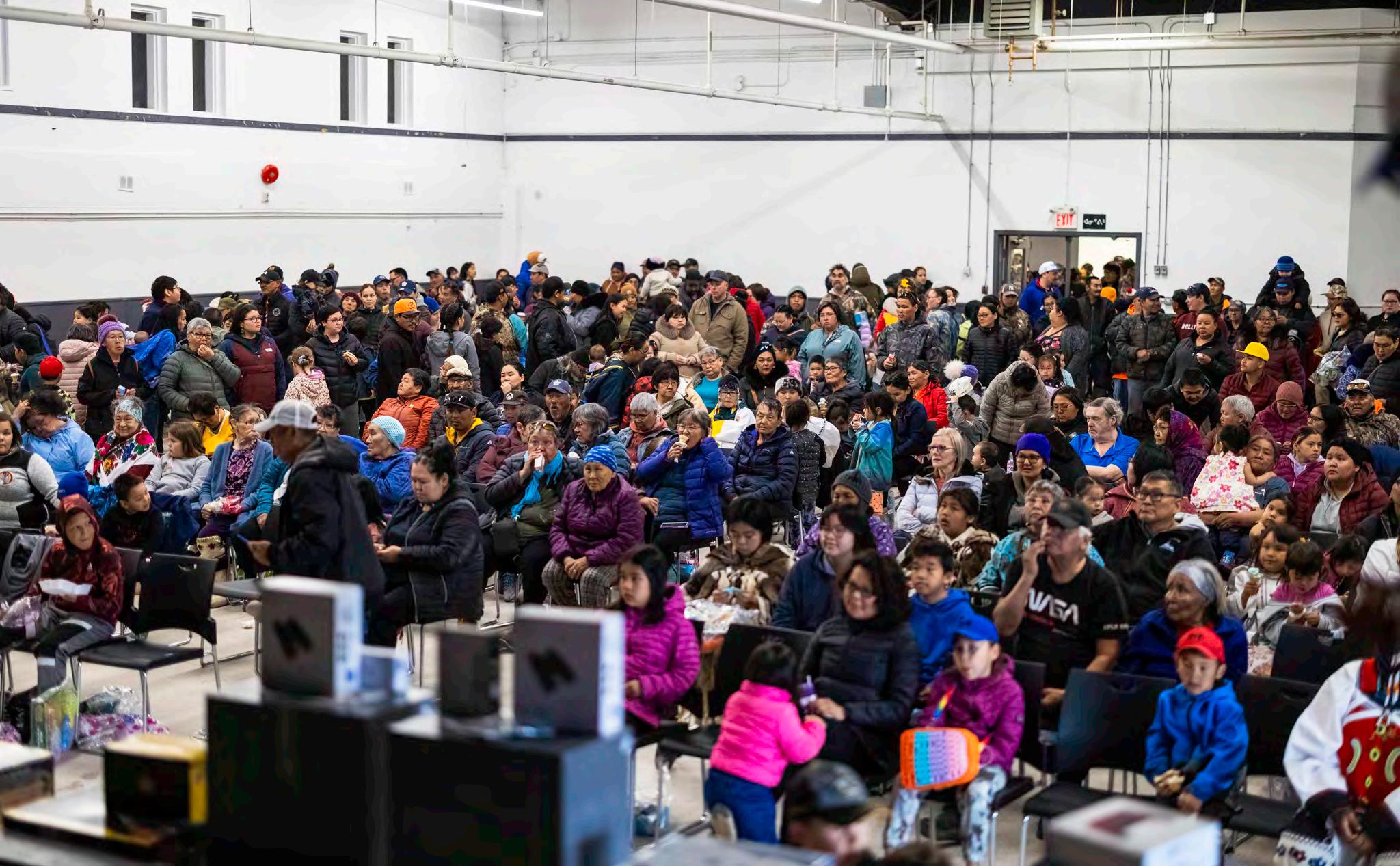

people enjoying the celebration of their territory.
Speeches, music, food, door prizes and contests kept the crowds busy, as many were decked out in traditional attire and Nunavut-inspired wear.
This year’s event marks 30 years since the original Nunavut land claim agreement was negotiated.

News North Nunavut www.NunavutNews.com A12 Monday, July 17, 2023 kNKu W?9oxJ5
Cathy Towtongie shows off her traditional outfit. Stewart Burnett/NNSL photo
The community hall was stuffed to the brim as people stayed out of the harsh winds Sunday, July 9. Stewart Burnett/NNSL photo
Kono Tattuinee, president of the Kivalliq Inuit Association, addresses the crowd. Stewart Burnett/NNSL photo
Natluitok and Iqaluk Nirlungayuk wear their traditional clothing. Stewart Burnett/NNSL photo


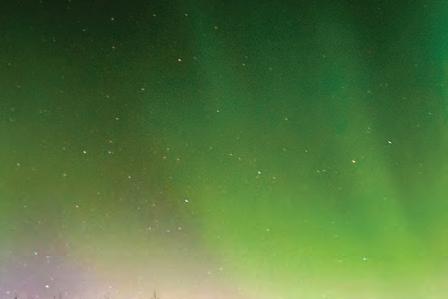
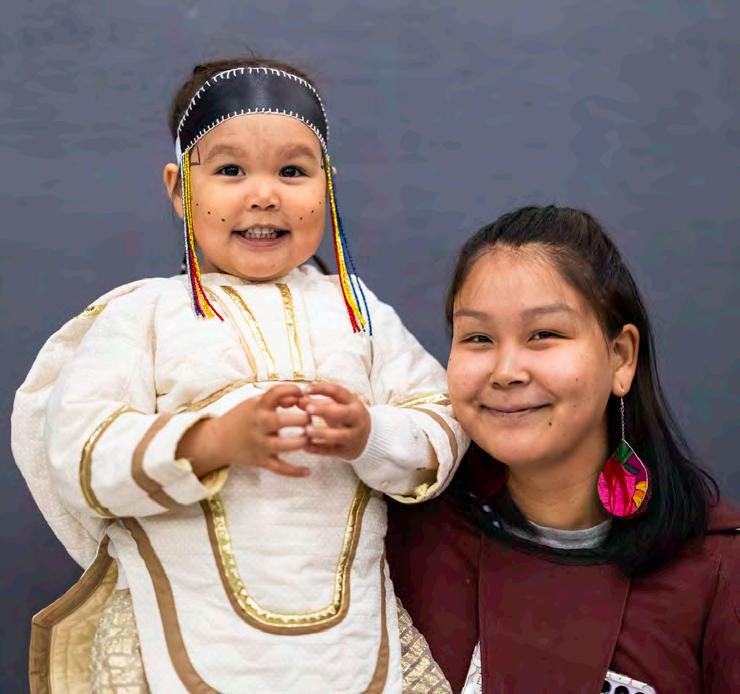
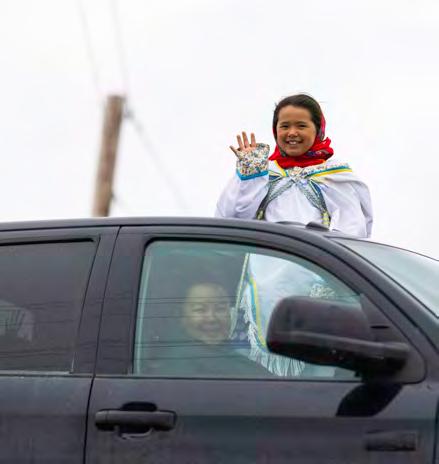
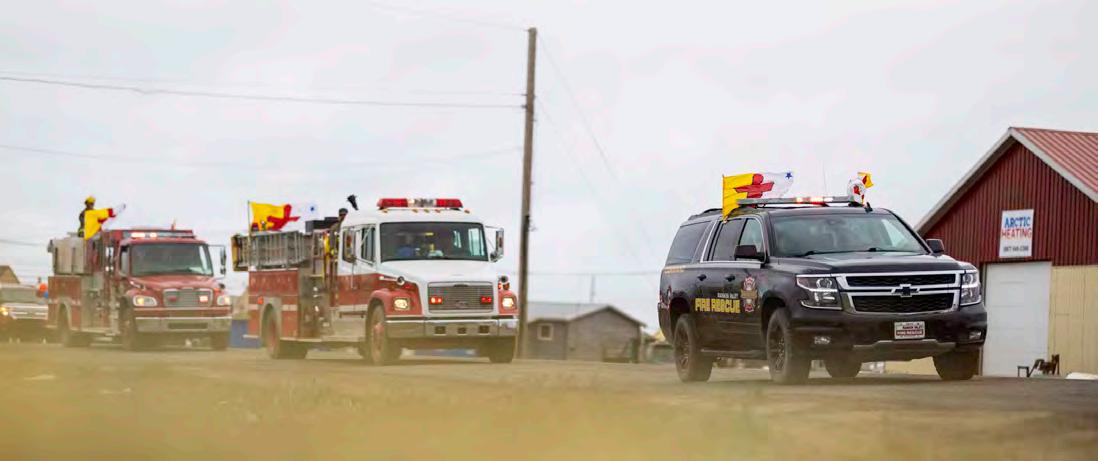
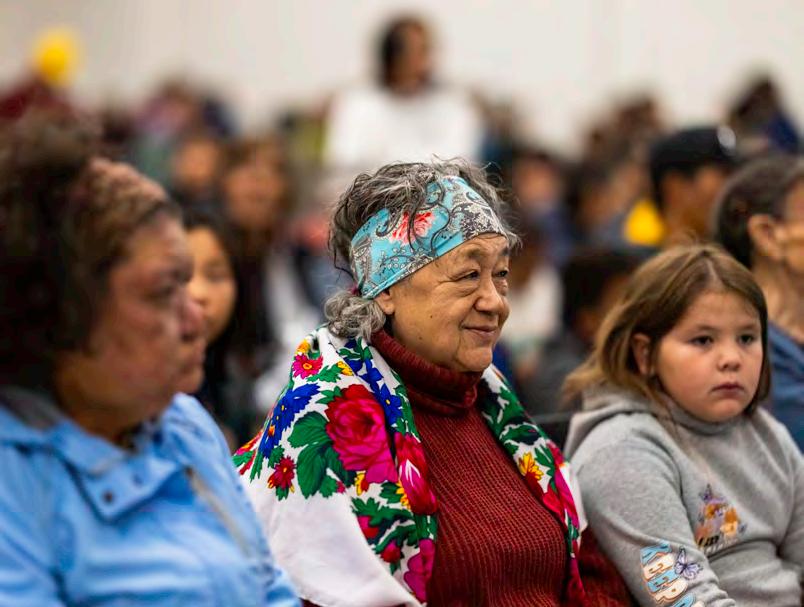



News North Nunavut Monday, July 17, 2023 A13 www.NunavutNews.com kNKu W?9oxJ5
x0p31Axy N4ystdJxl4
Kaya and Theresa Niakrok take in the fun. Stewart Burnett/NNSL photo
Petula Panigoniak and Tyra Claire Anautak pose for a photo. Stewart Burnett/NNSL photo
Levinia Brown, the first female mayor of Rankin Inlet, takes in the festivities. Stewart Burnett/NNSL photo
Malaiya Gibbons waves her flag from her window as the parade passes. Stewart Burnett/NNSL photo
Teresina Wadland waves from the top of her vehicle in the parade. Stewart Burnett/NNSL photo
Fire crews lead the way in the lunchtime parade. Stewart Burnett/NNSL photo
Johnny and Aatami Nakoolak do a Spiderman pose, similar to a pose they did for Kivalliq News at the 2022 Nunavut Day event. Stewart Burnett/NNSL photo
How Indigenous economic development corporations can support a just, low-carbon energy transition
There are more than 50,000 Indigenous businesses in Canada today. According to the 2020 census, the Indigenous economy generated a gross domestic product of $48.9 billion dollars. A growing number of First Nations, Inuit and Metis communities are establishing economic development corporations (EDCs), of which many are involved in the renewable energy sector.
Indigenous EDCs exist across a range of industries such as retail, forestry, fisheries, energy, mining, construction and hospitality. They have the potential to be major drivers for economic growth in Indigenous communities.
The role of Indigenous EDCs in the renewable energy sector has so far been unclear. Canada’s energy industry is responsible for 80 per cent of the country’s greenhouse gas emissions. Increasing renewable energy production is an important part of reducing emissions.
Today, Indigenous communities are involved in hundreds of large renewable energy projects and thousands of small ones.
Renewable energy
With support from community members and the band council, an Indigenous community can establish an EDC as a separate for-profit business entity to engage in commercial opportunities on its behalf. As a business, the EDC may enter into partnerships and joint ventures, including owning renewable energy projects. Unlike other businesses, the community’s members are the only shareholder. That means the EDC is responsible to the community and its board of directors.
Our research offers new findings about the role of Indigenous EDCs in supporting the development of renewable energy projects and how this
Indigenous communities can be involved in renewable energy projects in a number of ways. The benefits of revenues can be important to improving communities’ self-determination and economic reconciliation, according to researchers. The Canadian Press/Jeff McIntosh


links to socioeconomic benefits for communities.
In partnership with the Canadian Council for Aboriginal Business, we surveyed and interviewed eight representatives of First Nation EDCs with active renewable energy projects. Through online desk research and the survey and interview results, we were able to provide an overview of First Nation communities and EDC involvement in the renewable energy sector.
Indigenous communities can be involved in renewable energy projects in a number of ways. The benefits of revenues can be important to improving communities’ self-determination and economic reconciliation.
Benefits of ownership
In most projects, either the band council or the EDC can be involved in the project’s contractual arrangements.
These arrangements correlate to the amount of Indigenous ownership in a project. For example, communities can be equity owners in projects, either as full or partial owners, in which they receive revenues and some control over project decision-making.
When a community has little to no ownership in a project, the governance agreement between the Indigenous community and company developing it is usually a resource revenue or impact and benefit agreement. These types of agreements typically offer less control and economic benefits compared to when a community has meaningful or full ownership shares in a project.


Scholars, and some of our research participants, argue that ownership brings greater benefits to communities than revenue sharing or impact and benefit agreements that tend to be weaker
and short-lived.
Although all types of governance and ownership structures will likely provide some form of economic benefits, Indigenous ownership in a renewable energy project offers more control over decision-making and community pride.
Financial risks
According to our analysis, there are at least 294 Indigenous EDCs operating in Canada. In our study, we learned that up to 26 EDCs are involved in 47 solar, wind, biomass and hydroelectric projects that range in size from 0.5 to 230 megawatts. We also found that Indigenous EDCs more often tend to be involved in ownership of projects, such as partnerships and joint ventures, whereas the Band Council is more often involved in political governance structures such as resource-sharing agreements.
Despite the stronger benefits of ownership, our findings show Indigenous communities own few large renewable energy projects. Our interviews confirmed that not every community strives for whole ownership in renewable energy projects. Communities were concerned about the amount of money they’d need to borrow to finance the projects.
Some interviewees pointed out that the financial risk of greater project ownership may be too high for their community to take on. Some Indigenous and business leaders have called for an Indigenous loans guarantee program to ensure their communities can access the capital needed to partner in clean energy infrastructure projects. Ownership denotes control over a project, which would align with the United Nations Declaration on the Rights of Indigenous People and Indigenous rights to self-determination.
Indigenous EDCs are emerging as important players in renewable energy deployment, as they are involved in ownership of an increasing number of renewable energy projects of a range of sizes. With the right support, more EDCs could be involved in the development of renewable energy projects. This could strengthen Indigenous self-determination and give communities the ability to benefit from and control resource developments on their lands.
—By Christina E. Hoicka, associate professor of geography and civil engineering, University of Victoria, and Matthew Foss, vice-president of research and public policy, Canadian Council for Aboriginal Business. Katarina Savic from the consultancy firm Mokwateh co-authored this article and led the research project. This article is republished from The Conversation under a Creative Commons licence.
News North Nunavut www.NunavutNews.com A14 Monday, July 17, 2023 kNKu W?9oxJ5 Submit a photo x0p31Axy N4ystdJxl4
Former MLA Tommy Enuaraq dies
Tommy Enuaraq, who served as MLA for the constituency of Baffin Central in the legislative assembly of the Northwest Territories prior to division in 1999, died earlier this month.
The community flags of Clyde River, Pangnirtung and Qikiqtarjuaq were placed at halfmast at the legislative assembly in his honour. Speaker Tony Akoak stated, “I was saddened to learn of the recent passing of Tommy Enuaraq… (who) passed away following a long illness. Mr. Enuaraq was an educator, author and leader who represented his constituents with pride. On behalf of all members of the legislative assembly, we extend our condolences to his family.”
ITK takes issue with meeting invitees
Inuit Tapiriit Kanatami released a joint statement with the Metis National Council ahead of the meeting of National Indigenous Leaders and Premiers in Winnipeg July 10.
“ITK generally welcomes any opportunity to share Inuit priorities with territorial and provincial leaders, but any such meeting should be done with clear objectives and be respectful

of Inuit governance,” stated ITK president Natan Obed in the release.
He and Metis National Council President Cassidy Caron went on to say that the two organizations believe in the need for intergovernmental forums where Inuit and Metis representative institutions can meaningfully engage with provincial and territorial governments.
“However, the invitation of various organizations to said meetings, such as the Congress of Aboriginal Peoples and Native Women’s Association of Canada, which claim to represent Inuit and Métis rights, is inappropriate,” states the release.
“These organizations are not recognized by the four Inuit treaty organizations which collectively represent all Inuit, or the democratically elected Métis governments which represent Métis citizens across the homeland in Inuit and Métis relationships with the Crown. Discussions with such organizations are not constructive because only Inuit treaty organizations have the mandate or the ability to work on behalf of Inuit, and Métis Governments the mandate to represent Métis Nation citizens. It is both ITK and MNC who are the duly mandated national representatives who are best placed to collaborate with federal, provincial or territorial governments.”
Nunavut Day champs
The news release goes on to state that “Canadians deserve more than an annual photograph of politicians” and that when federal, provincial and territorial leaders are in a position to work constructively with Indigenous peoples, Inuit and the Metis Nation will be happy to work in partnership.
Health deals for Northern territories


Nunavut, Northwest Territories and Yukon all signed on to Prime Minister Justin Trudeau’s health funding offer earlier this month, leaving Quebec the only holdout on the new accords.
Trudeau presented his offer to provincial and territorial premiers in February as local politicians, doctors, nurses and health advocates raised concerns about a national health-care crisis.
At the time, premiers signalled that they would agree, though the prime minister’s offer fell well short of what they had hoped for.
Territorial leaders suggested they were disappointed with the offer and called on the federal government to put more money toward the Territorial Health Investment Fund, which helps pay for medical travel and other costs of delivering health care in the North.
Health Minister Jean-Yves Duclos says there was a breakthrough in negotiations with the territories after the federal government agreed to put $350 million toward that fund over the next 10 years.
Duclos says his office is still negotiating with Quebec.
—The Canadian Press
Take caution around powerlines
Qulliq Energy Corporation used a news release to remind Nunavummiut to exercise caution around power poles and power lines to avoid power outages, injury and death.
The suggestions include keeping a minimum distance of three meters from overhead power lines; not flying kites near power lines; keeping away from service wires going into buildings; refraining from placing large items such as crates and sea cans underneath service wires; using a spotter when operating powered mobile equipment and a view of the path is not clear; and contacting QEC if digging near a power pole is required.
To report a power outage or power-related emergency, call QEC’s 24-hour emergency number at 1-867-222-3807.

News North Nunavut Monday, July 17, 2023 A15 www.NunavutNews.com kNKu W?9oxJ5
A five-team softball tournament helped ring in Nunavut Day, as games were played over both July 9 and July 10. In the end, the Liners came out on top, pictured above. Back row, from left are Darren Ikakhik Sr., Jayko Ashoona, Koby Connelly, Ben Tulugak, Wager Tatty, Hunter Nakoolak, James Connelly and Yvon Mamgark. Front row, from left are Leora Ikhakhik, Kilabek Connelly and Vivian Paniyuk. Missing from the photo are Nolan Tattuinee and Israel Maktar. Photo courtesy of Taina Aliya Kubluitok
News Briefs
Get another Covid-19 booster in the fall, Canada’s immunization panel recommends
Regulatory review still underway for new






Canadians should get another Covid-19 vaccine booster in the fall if it’s been at least six months since their last dose or Covid-19 infection, the National Advisory Committee on Immunization (NACI) said on June 11.

“Booster doses in the fall will be formulations updated to target more recent, immune-evasive SARSCoV-2 variants,” the NACI statement said.

“Individuals vaccinated with the updated formulation are expected to benefit from a better immune response against these variants compared to current vaccines,” it said.
Both Pfizer-BioNTech and Moderna have started the process to get the new formulations of their mRNA Covid-19 vaccines approved by Health Canada, the department said in an email to The Canadian Press.
“This regulatory review has not yet been completed,” Health Canada said. “More information on this vaccine, including the authorized age groups, will be available in the coming months.”
NACI continued to strongly recommend that anyone five years of age and older who hasn’t yet been vaccinated should be immunized with a primary two-dose series of an mRNA vaccine.
variations of vaccines
It also issued a “discretionary recommendation” that children six months to five years of age who haven’t yet been vaccinated get the two-dose primary series of an mRNA vaccine.
The existing bivalent Omicron-containing mRNA vaccines can be used for people receiving their first two-dose vaccination series, NACI said.
Immunization this fall is “particularly important for those at increased risk of Covid-19 infection or severe disease,” NACI’s statement said.

Those vulnerable groups include people aged 65 and older, residents of long-term care homes or other group living settings, people with underlying medical conditions, people who are pregnant, people from First Nations, Métis and Inuit communities, people who are racialized and people who provide essential community services, it said.
The mRNA vaccines available in Canada are manufactured by Pfizer-BioNTech and Moderna.
Although mRNA Covid-19 vaccines are “preferred,” NACI said Novavax’s Nuvaxovid should be offered as a booster to adults 18 years of age and older who are “unwilling or unable to receive an mRNA vaccine.”
—By Nicole Ireland, The Canadian Press
News North Nunavut www.NunavutNews.com A16 Monday, July 17, 2023 kNKu W?9oxJ5
x0p31Axy N4ystdJxl4
Canada’s National Advisory Committee on Immunization (NACI) says people should get another Covid-19 booster in the fall if it’s been at least six months since their last dose or Covid-19 infection. The Canadian Press/Lars Hagberg
Canada’s Indigenous women forcibly sterilized decades after other rich countries stopped
NWT doctor’s licence suspended; Inuk patient files $6-million lawsuit against physician and hospital
Decades after many other rich countries stopped forcibly sterilizing Indigenous women, numerous activists, doctors, politicians and at least five class-action lawsuits say the practice has not ended in Canada.

A Senate report last year concluded “this horrific practice is not confined to the past, but clearly is continuing today.” In May, a doctor was penalized for forcibly sterilizing an Indigenous woman in 2019.
Indigenous leaders say the country has yet to fully reckon with its troubled colonial past — or put a stop to a decades-long practice that is considered a type of genocide.
There are no solid estimates on how many women are still being sterilized against their will or without their knowledge, but Indigenous experts say they regularly hear complaints about it. Sen. Yvonne Boyer, whose office is collecting the limited data available, says at least 12,000 women have been affected since the 1970s.
“Whenever I speak to an Indigenous community, I am swamped with women telling me that forced sterilization happened to them,” Boyer, who has Indigenous Metis heritage, told The Associated Press (AP).
Medical authorities in the Northwest Territories issued a series of punishments in May in what may be the first time a doctor has been sanctioned for forcibly sterilizing an Indigenous woman, according to documents obtained by the AP.
The case involves Dr. Andrew Kotaska, who performed an operation to relieve an Indigenous woman’s abdominal pain in November 2019. He had her written consent to remove her right fallopian tube, but the patient, an Inuk woman, had not agreed to the removal of her left tube losing both would leave her sterile. Despite objections from other medical staff during the surgery, Kotaska took out both fallopian tubes.

The investigation concluded there was no medical justification for the sterilization, and Kotaska was found to have engaged in unprofessional conduct. Kotaska’s “severe error in surgical judgment” was unethical, cost the patient the chance to have more children and could undermine trust in the medical system, investigators said.
The case was likely not exceptional.
Thousands of Indigenous Canadian women over the past seven decades were coercively sterilized, in line with eugenics legislation that deemed them inferior.
Gerri Sharpe, president of Pauktuutit Inuit Women of Canada, said health centers serving Inuit women often aren’t staffed by Indigenous people, resulting in translation problems. For example, in Inuit culture, people often communicate with facial expressions, like raising their eyebrows for “yes” or wrinkling their nose for “no.”
“Doctors will be speaking, and they look to the woman to acknowledge something. When she (raises her eyebrows), the doctor labels it as `non-responsive,”’ Sharpe said.
Dr. Ewan Affleck, who made a 2021 film, ” The Unforgotten,” about the pervasive racism against Canada’s Indigenous people, said the way forced sterilization happens now is more subtle than in the past. He noted an ongoing “power imbalance” in the country’s health system. “If you have a white doctor saying to
an Indigenous woman, `You should be sterilized,’ it may very likely happen,” he said.
$6-million lawsuit

Kotaska, the ob-gyn who carried out the surgery that left an Indigenous woman sterile in 2019, was the president of the Northwest Territories Medical Association and held teaching positions at several Canadian universities.
Documents show an anesthetist and surgical nurse became alarmed when Kotaska said during the surgery to remove the woman’s right fallopian tube: “Let’s see if I can find a reason to take the left tube as well.”
Kotaska told investigators he was “voicing his thought process out loud” that removing both tubes would lessen the woman’s pelvic pain, the documents say.
Describing Kotaska’s actions as “a violation of his ethical obligations,” investigators suspended Kotaska’s medical licence for five months, ordered him to take an ethics course and reim-

burse the cost of the inquiry. The Northwest Territories health department said it was the first time a “non-consensual medical procedure” had been referred for investigation.

The woman is suing Kotaska and hospital authorities for $6 million.
There was no suggestion in the documents that Kotaska was motivated by racism. Kotaska declined to comment to the AP.
The Canadian government would not comment on Kotaska’s actions but said forced sterilization is illegal and prosecutable under Canadian criminal law. The Royal Canadian Mounted Police in the Northwest Territories said there is no criminal investigation into Kotaska.
“People don’t want to believe things like this are happening in Canada, but cases like this explain why entire First Nations populations still feel unsafe,” said Dr. Unjali Malhotra, medical officer of the First Nations Health Authority in British Columbia.
—By Maria Cheng, The Associated Press
Nunavut News Monday, July 17, 2023 A17 www.NunavutNews.com kNKu W?9oxJ5
Dr. Andrew Kotaska was found to have engaged in unprofessional conduct after removing both fallopian tubes from an Inuk patient. Photo courtesy of Andrew Kotaska
May Sarah Cardinal and her daughter, Anita Cardinal, stand for a portrait outside the Law Courts building in Edmonton, Alberta, Canada on Thursday, May 25, 2023. There are at least five class-action lawsuits against health, provincial and federal authorities involving forced sterilizations in Alberta, Saskatchewan, Quebec, British Columbia, Manitoba, Ontario and elsewhere. May Sarah is the representative plaintiff in the Alberta class action. (AP Photo/Amber Bracken)




Nunavut News www.NunavutNews.com A18 Monday, July 17, 2023 kNKu W?9oxJ5













Nunavut News Monday, July 17, 2023 A19 www.NunavutNews.com kNKu W?9oxJ5

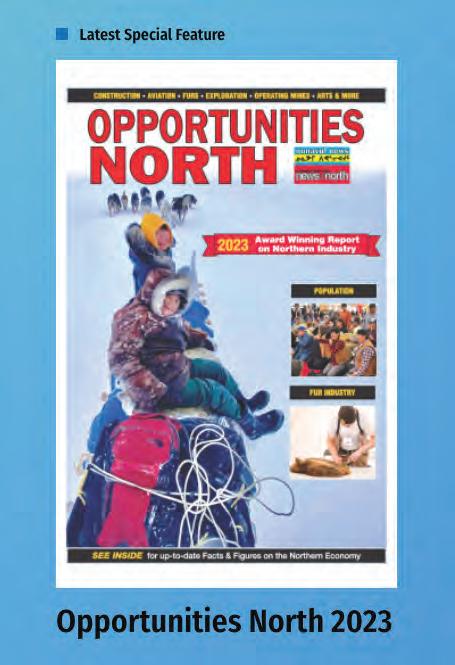
Nunavut News www.NunavutNews.com A20 Monday, July 17, 2023 kNKu W?9oxJ5











 By Tom Taylor Northern News Services
Local Journalism Initiative reporter
By Tom Taylor Northern News Services
Local Journalism Initiative reporter
























































































